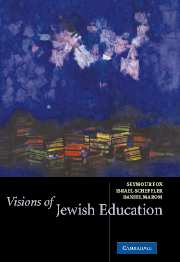Book contents
- Frontmatter
- Contents
- Preface and Acknowledgments
- About the Mandel Foundation
- Introduction
- Part I The Visions Project
- Part II Visions in Detail
- Introduction
- 4 What Must a Jew Study – and Why?
- Supplement: Isadore Twersky
- 5 Jewish Studies in Israel from a Liberal-Secular Perspective
- Supplement: Menachem Brinker
- 6 We Were as Those Who Dream: An Agenda for an Ideal Jewish Education
- Supplement: Moshe Greenberg
- 7 Reflections on the Educated Jew from the Perspective of Reform Judaism
- Supplement: Michael A. Meyer
- 8 Educated Jews: Common Elements
- Supplement: Michael Rosenak
- 9 The Concept of the Educated Person: With Some Applications to Jewish Education
- Supplement: Israel Scheffler
- Part III Visions in Context
- Conclusion: The Courage to Envision
- The Visions Project: Participants and Forums
- Index
5 - Jewish Studies in Israel from a Liberal-Secular Perspective
Published online by Cambridge University Press: 08 January 2010
- Frontmatter
- Contents
- Preface and Acknowledgments
- About the Mandel Foundation
- Introduction
- Part I The Visions Project
- Part II Visions in Detail
- Introduction
- 4 What Must a Jew Study – and Why?
- Supplement: Isadore Twersky
- 5 Jewish Studies in Israel from a Liberal-Secular Perspective
- Supplement: Menachem Brinker
- 6 We Were as Those Who Dream: An Agenda for an Ideal Jewish Education
- Supplement: Moshe Greenberg
- 7 Reflections on the Educated Jew from the Perspective of Reform Judaism
- Supplement: Michael A. Meyer
- 8 Educated Jews: Common Elements
- Supplement: Michael Rosenak
- 9 The Concept of the Educated Person: With Some Applications to Jewish Education
- Supplement: Israel Scheffler
- Part III Visions in Context
- Conclusion: The Courage to Envision
- The Visions Project: Participants and Forums
- Index
Summary
The approach of my essay is liberal in two senses. The usual meaning of the word will be explained in my discussion of the value of freedom in education and how it comes into conflict with teachers' attempts to indoctrinate students in school.
But the liberalism I advocate has another meaning, which is evident in internal Jewish debates at the end of the nineteenth century and the beginning of the twentieth regarding the definition of Judaism or Jewishness. In contrast to the German Jewish philosophers (Moses Mendelssohn, Samson Raphael Hirsch, Hermann Cohen) who viewed Judaism as a distinct spiritual school of thought that could be defined as “a philosophy,” a Weltanschauung or at least as “an ethics,” the Eastern European Jewish writers and thinkers (Peretz Smolenskin, Moses Leib Lilienblum, Aḥad Ha-Am, Simon Dubnow, David Frischmann, Micha Josef Berdyczewski, Yosef Ḧayyim Brenner) conceived of a different model.
According to this model, Judaism is first and foremost a historical fact. The Jewish people is a collective whose continuous historical existence derives from shared memories (especially memories of a common fate); shared languages (Hebrew and many different jargons); shared destiny (determined to a great extent by anti-Semites in the present); and, sometimes, shared expectations of the future. The bonds among the generations are based on the feeling of their being part of one family.
- Type
- Chapter
- Information
- Visions of Jewish Education , pp. 95 - 105Publisher: Cambridge University PressPrint publication year: 2003
- 3
- Cited by



